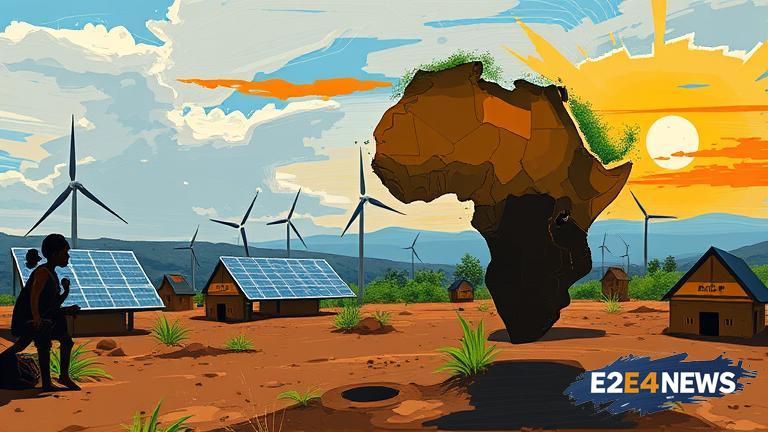Africa is undergoing a significant transformation in its energy landscape, with a growing focus on renewable energy sources such as solar, wind, and hydroelectric power. This shift is driven by the need to reduce dependence on fossil fuels, mitigate climate change, and provide access to energy for the continent’s rapidly growing population. According to recent reports, Africa has the potential to generate over 1,000 gigawatts of renewable energy, which is more than twice the current total installed power capacity on the continent. The African Union has set a target of achieving 300 gigawatts of renewable energy capacity by 2030, which is expected to create over 2 million new jobs and stimulate economic growth. Several African countries, including South Africa, Egypt, and Morocco, are already making significant strides in the development of renewable energy. For example, South Africa has launched a series of renewable energy auctions, which have attracted significant investment from international companies. Egypt has also announced plans to generate 20% of its electricity from renewable sources by 2022, while Morocco is aiming to generate 52% of its electricity from renewable sources by 2030. The development of renewable energy in Africa is also being driven by the need to address energy poverty, which affects over 600 million people on the continent. Renewable energy can provide a cost-effective and sustainable solution to energy poverty, particularly in rural areas where access to energy is limited. In addition, renewable energy can also help to reduce greenhouse gas emissions and mitigate the impacts of climate change, which are already being felt in many African countries. The use of renewable energy can also help to improve energy security, reduce dependence on imported fuels, and stimulate local economic development. Furthermore, the development of renewable energy in Africa is also being driven by the need to promote sustainable development and reduce poverty. The United Nations’ Sustainable Development Goals (SDGs) include a target to ensure access to affordable, reliable, and modern energy for all by 2030, which is closely aligned with the African Union’s renewable energy targets. The development of renewable energy in Africa is also being supported by international organizations, such as the International Renewable Energy Agency (IRENA) and the African Development Bank (AfDB). These organizations are providing technical assistance, financing, and capacity-building support to help African countries develop their renewable energy sectors. In conclusion, Africa’s renewable energy revolution is gaining momentum, driven by the need to reduce dependence on fossil fuels, mitigate climate change, and provide access to energy for the continent’s rapidly growing population. With the right policies, investments, and international support, Africa can unlock its vast renewable energy potential and achieve a sustainable energy future. The development of renewable energy in Africa is a critical component of the continent’s sustainable development agenda, and it is essential that African countries continue to prioritize the development of renewable energy in the coming years. The use of renewable energy can help to reduce energy poverty, improve energy security, and stimulate local economic development, while also contributing to the achievement of the SDGs. Overall, the future of renewable energy in Africa looks bright, with significant opportunities for growth, investment, and development in the coming years.




